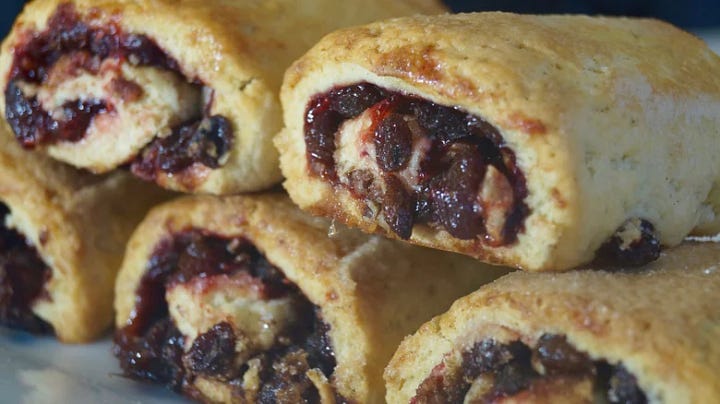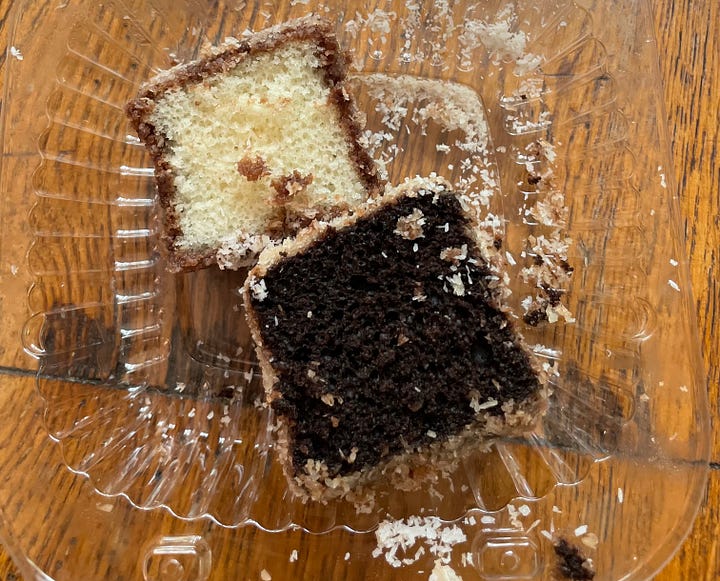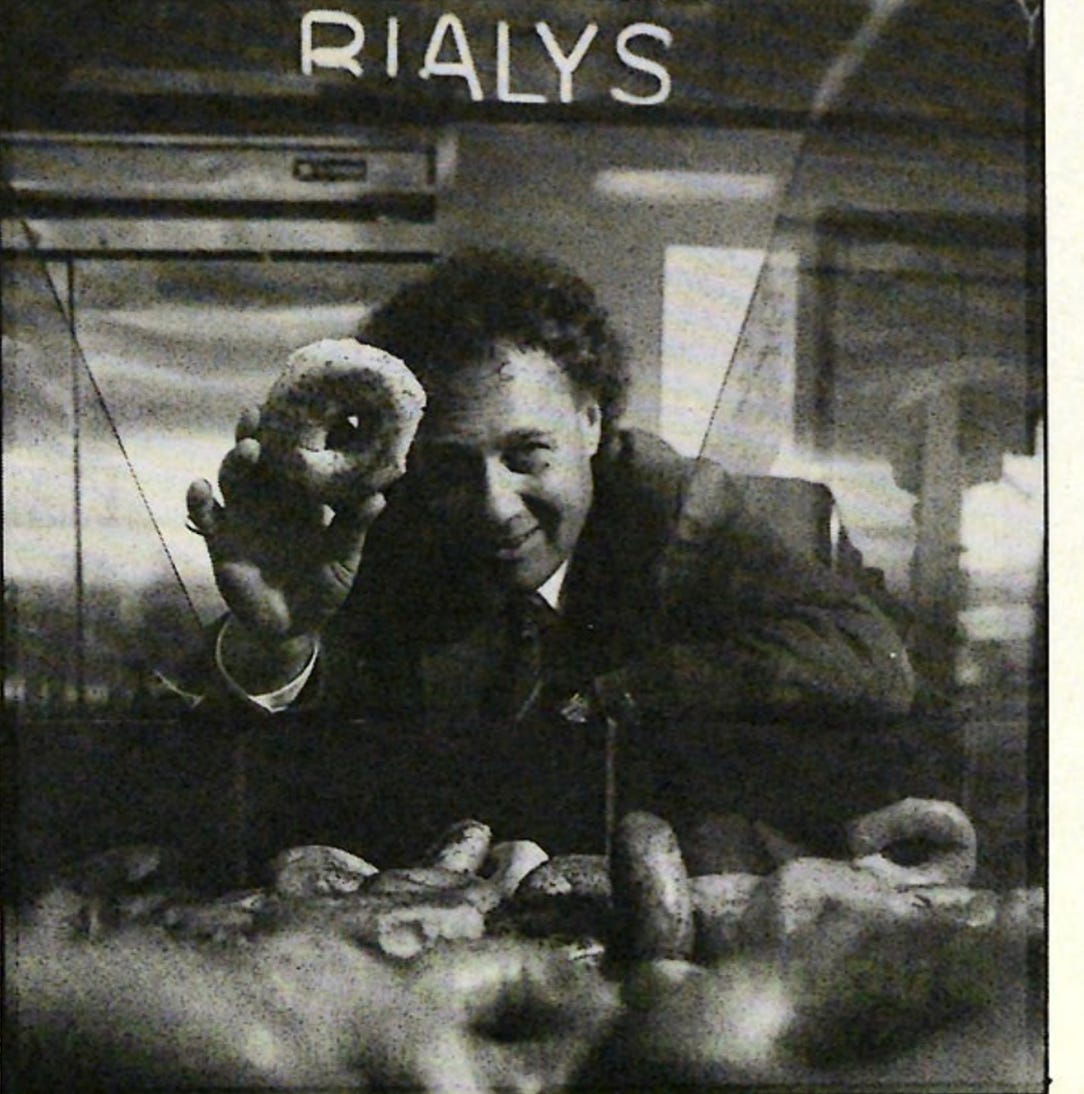Bialy Baker Union enters the chat
The six degrees of separation of this bagel quest led me from Detroit bagels to Bialy Baker Union and from Jewish scrap metal businesses to the Russian tea biscuits of Cleveland's Davis Bakery.
Last Friday Matt (and Theo) and I headed east for our annual drive to the Berkshires to spend time with my family. Thanks to the quest I am now a devoted Kaufman’s Deli fan, so we decided to brave Chicago traffic and stop there to buy some food for the car and to bring a challah and some babka to my friends Michael and Ruth’s house in Ann Arbor, where we were stopping for the night. The heaps of homemade roast turkey and salami slices on the Uncle Lenny sandwich plus the fresh pickle out of the barrel made (although just barely) the traffic worth it.


If this Midwest bagel quest has taught me anything, it is that it is easy to find Midwest Jewish connections. Ruth suggested I stick around for lunch on Saturday since her cousin-in-law was stopping by and she thought he might have a connection to some of the longstanding bagel makers in Detroit. Well turns out he and his stepfather Mort had lunch the day before with Richard Steinek, the owner of the Detroit Bagel Factory. A quick text to Mort and then I was texted Richard’s phone number. I did a Google search of Richard Steinek and learned of his bialy baker past and that he had been the Chairman of the Bialy Baker Union in the 1960s. I have been slightly obsessed with the Bagel Baker Union 338 since I first learned about them at the start of the quest. They were so powerful in New York City that they were able to completely shut down bagel production when they went on strike, which the New York Times at the time referred to as the “bagel famine”. I definitely wanted to talk to someone who was in a bialy union. So I called him, he put me on speaker phone and we talked for the length of his twelve minute drive and I learned some history.
Bialys have their roots in Bialystok, Poland. The word is actually an abbreviation of a longer Yiddish word, Bialystoker Kuchen which can be translated to"little bread from Bialystok.” Richard’s father-in-law was from Bialystok and opened Bronx Bialy when he came to NYC. Richard apprenticed at Bronx Bialy, joined the union (which I think might actually have been called the Bialy Bakers Association, Inc., if the Internet can be believed), and then started baking bialys in Brooklyn, where he lived. The Bialy Baker Union had forty members so were not big enough to be their own thing the way the Bagel Bakers Union were their own thing, it was part of the AFL CIO. The bialy bakers went on strike one time and Richard was the one who called the strike.
In the mid 1960s Richard joined forces with a guy in the Bagel Baker Union and they headed out for University Heights, Ohio to open their own shop. They both wanted to own their own shop and couldn’t do that in New York. So Richard taught the other guy how to make bialys and the other guy taught him how to make bagels and westward they went. This scratched my curiosity itch since I really want to know how many bagel shops that opened outside NYC in the late 1960s were opened by bakers from Bagel Baker Union 338. According to Richard, the first one was opened in Baltimore, the second one by the Cohen’s in Lincolnwood, IL (New York Bagel and Bialy which I quested to and loved) and he was the third in University Heights. In 1967 he invested in Detroit Bagel Factory that was founded by Sam Anbender and at one point in time Richard owned several bagel shops and had a contract with Northwest airlines to provide 60,000 breakfast bagels weekly. Since he started making bagels before bagel making machines were ubiquitous, I asked him about the technological change. Most of the articles I read that quoted bagel bakers back in the 1970s bemoaned the technology and what it meant for their skilled work and profession, but Richard didn’t view it that way. The machines enabled him to increase production since they took the place of many people and enabled him to expand. When I mentioned the millennial artisanal bagel bakers I have met on the quest, he said, “who wants to stand ten hours a day and be a laborer. To me that is stupid.”

While bialys were not my everyday food growing up the way a bagel was, I have had many a great bialy, and they are something special. First of all they are crusty and chewy. Then they have a indentation in the middle that is filled with flavorful onions. I was at my dad’s house yesterday and asked him where was his favorite place to get a bialy when he was a kid and he said any of three bakeries on 187th street. He grew up in Washington Heights in Manhattan, on Ft. Washington Avenue. In the 1940s there were three Jewish bakeries on 187th street, a few blocks from his house. He would walk there and buy rye bread for the family to have for breakfast on Sunday morning and get a second loaf to eat on the way home. And got his bagels and bialys there too. (You can hear my dad describe why he likes bialys below).
When Matt and I left Ann Arbor this past Sunday we still had eleven hours of driving before we got to my brothers house in the Berkshires. We stopped at D & R Bagels outside of Cleveland to meet up with Norm and Sue Pollack to talk bagels. Jon Pollack, a friend of the bagel quest and a Midwest Jewish historian connected me with his dad, who grew up eating Cleveland bagels and had stories to tell. The D & R bagels were subpar, but the stories and visit were a treat. And they gave me a hefty bag filled with two Jewish Ashkenazi pastries, that seem unique to Cleveland…Russian tea biscuits and coconut bars. It was our wedding anniversary on Sunday, and as we put twenty-nine years of marriage to the test by spending it in the car….munching on these pastries…along with the Zingerman’s Deli snacks…did its part to make a day in a car feel celebratory.







Truth be told, I’m more of a bialy guy than I bagel guy.
Speaking of rugelach... in the picture those Cleveland tea biscuits look a lot like my mother's rugelach. (definitely filled with jam and raisins, no cream cheese)